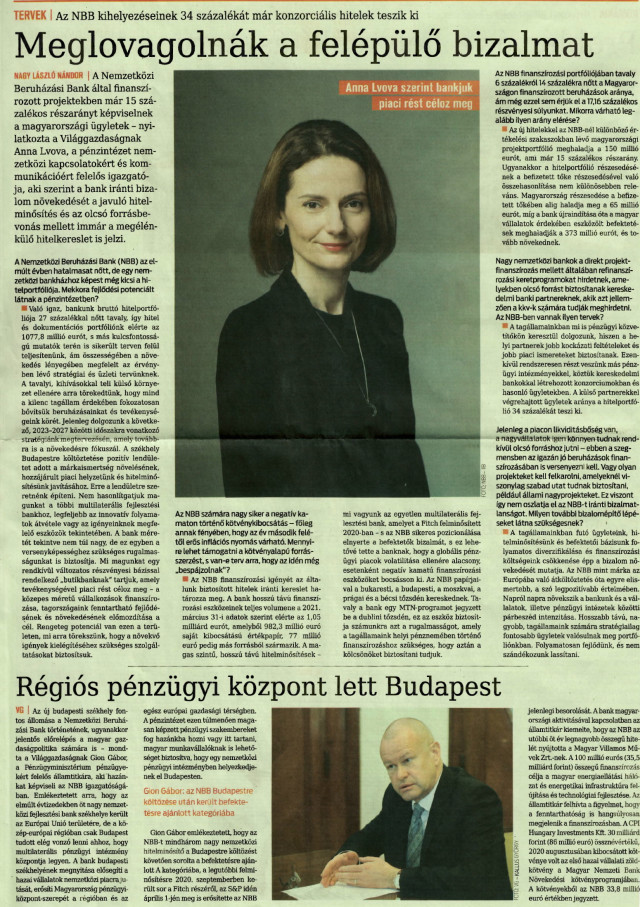Gábor Gion, the Minister of State for Financial Policy Affairs in the Ministry of Finance of Hungary, and Anna Lvova, Director of International Relations and Communications of IIB, spoke to the business daily Világgazdaság

IIB builds on developing trust
"The Hungarian deals already account for 15% of the IIB loan portfolio," - Anna Lvova told Világgazdaság. According to the IIB Director of International Relations and Communications, the growing trust for the Bank is reflected in the rising credit appetite from the borrowers as well as the IIB’s credit ratings constant improvement and decrease of borrowing costs.
The IIB has shown a drastic growth in the last year, however its loan portfolio is still small compared to other multilateral development institutions. How do you see the growth potential of IIB?
It is true that our Bank's gross loan and documentary portfolio increased by 27% last year and reached EUR 1,077 bn. We also managed to exceed our plans in other key indicators, but overall the growth was essentially in line with our current strategy and business plan. Despite a rather challenging external environment, we aim to stick to our plans and are gradually expanding our investments and operations in the interest of all our nine member states. Currently, a lot of work is being carried out to draft a concept of our next strategy 2023-2027 keeping the focus on growth. Headquarters relocation gave a strong positive impetus to raising our brand awareness, improving market positioning and credit ratings. And, we would like to build on that momentum seeing a growing demand for our financing. Comparing us to other multilateral development banks is not something we do, unless it concerns adoption of innovative processes or instruments that fit our needs. Our Bank is not too big in terms of its size, but it gives us necessary flexibility to be competitive. We like to think of ourselves as a “boutique bank” with a very diverse shareholder base, which occupies its own niche – namely, financing of mid-sized companies, promoting sustainable economic development of our countries and contributing to their growth. There is a lot of potential in that area and we are determined to continue providing necessary services to meet the growing demand.
For IIB, the negative interest rate of its bond issues is a great success – especially in light of the fact that the second half of the year is expected to bring strong inflation pressure. How much can bond-based funding be supported, and are there any plans for setting something aside this year?
The growing demand for our loans dictates the funding needs of IIB. Total volume of long-term funding of the Bank as of March 31, 2021 equaled to EUR 1,05 bn with EUR 982,3 million of own bond issues and EUR 77 million from other sources. The high-level long-term credit ratings - we are the only multilateral development bank that had been upgraded by Fitch in 2020 - together with the efficient positioning of IIB, improved investors’ trust, allowing the Bank to issue funding at low rates (negative, in some cases) even in conditions of high volatility of global financial markets. IIB bonds are currently traded on the Bucharest, Budapest, Moscow, Prague and Vienna stock exchanges. Last year, the Bank registered an MTN Program on the Dublin Stock Exchange; this instrument gives us necessary flexibility when we need funding in local currencies of our member states to then grant necessary loans.
The share of the Hungarian projects you supported recently grew from 6% to 14% of the loan portfolio, though this is still less than the country’s contribution to the paid in capital, which stands at 17.16%. When can we expect to achieve parity?
The volume of the new loans in the IIB Hungarian pipeline under various stages of assessment currently exceeds EUR 150 million, which already represents a 15% share. However, the comparison of share in the loan portfolio to a contribution to the paid-in capital is not particularly relevant. The share of Hungary in the IIB paid-in capital is just above EUR 65 million, while the accumulated volume of the Bank’s investment support in the interests of Hungarian companies since the relaunch of IIB exceeds EUR 373 million and is constantly growing.
In addition to direct project financing, big multilateral investmentbanks generally announce refinancing framework programs providing affordable financial resources for their partner commercial banks to support SMEs. Does IIB have similar plans?
We are working also through financial intermediaries in our member states, since local partners can have a better risk understanding and market knowledge. Moreover, we have become regular participants of syndicates and similar deals with other financial institutions, including commercial banks. As of now, the deals with external partners account for 34 % of the IIB loan portfolio.
The market is currently enjoying surplus liquidity and corporations are easily able to acquire exceptionally affordable resources – in this segment, there is competition even in financing very good investment projects. Or support has to be given to a project where we can give the recipient a free hand – for example, in large, state-funded projects. However, this does not dissipate the lack of trust surrounding the IIB. What other steps do you consider necessary to build trust?
Our current pipeline of deals in the member states, our high credit ratings, continuous diversification of our investor base and decreasing cost of our funding evidently speak about market trust. IIB brand since relocation to Europe has been experiencing increased recognition and in the most positive sense. Our dialogue with companies and financial institutions becomes more intense with every day. Longer-term, larger, strategically important deals for our states are taking their place in our portfolio. We are evolving and have no intention to slow down.
Mr. Gábor Gion: "Budapest has become an important regional financial center".
The opening of the new IIB Headquarters in Budapest is an important step in the history of the Bank as well as a notable achievement for Hungarian economic policy – Mr. Gábor Gion told Világgazdaság.
The Minister of State for Financial Policy Affairs in the Ministry of Finance of Hungary and the Vice-Governor representing Hungary in the IIB Board of Governors recalled that recent decades have seen five large international development banks establish headquarters in the European Union, but in the CEE region only Budapest proved to be attractive enough to host the headquarters of a multilateral financial institution.
The opening of the Bank’s headquarters in Budapest helps Hungarian companies to reach international markets and strengthens Hungary’s role as a financial center both in the region and in the entire European Economic Area. In addition, the financial institution will also draw highly qualified financiers to Hungary or convince them to stay, thus also providing Hungarian professionals a chance to work at an international financial institution here in Budapest.
Mr. Gábor Gion pointed out that after the IIB relocated to Budapest, all three big international credit rating agencies brought its long term investment ratings up to the highest “A”- level category; the latest upgrade by Fitch took place in September 2020, and on the 1st of April this year S&P affirmed the current ”A-“rating of the institution.
Speaking on the Banks’ investment activities, the Minister of State emphasized that its largest loan within past 5 years IIB granted to Magyar Villamos Művek Zrt (MVM), a Hungarian energy company. The purpose of the EUR 100 million (HUF 35.5 billion) loan is to renew and develop the Hungarian energy supply network and energy infrastructure. The Minister of State also drew attention to the fact that sustainability remains among key investment priorities of the Bank. So, IIB became one of the anchor investors of the first Hungarian corporate green bonds issue within the Bond for Growth initiative of the National Bank of Hungary, placed in August 2020 by CPI Hungary Investments Kft. with a total volume of HUF 30 billion (EUR 86 million). The volume of IIB investments amounted to EUR 33.8 million.


